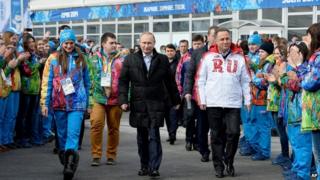Putin's hopes to burnish Russia's image with Sochi 2014
- 6 February 2014
- From the section Europe

It was July 1980 and in the packed Central Lenin Stadium in Moscow, the Soviet leader Leonid Brezhnev declared the Summer Olympic Games open.
But amid all the pomp and ceremony of this, the first Olympics behind the Iron Curtain, there was one thing Brezhnev failed to mention in his welcome speech: just a few years earlier, he had seriously considered ditching the whole project.
In 1975, General Secretary of the Soviet Communist Party Brezhnev had written to a colleague in the Politburo complaining of the costs involved and warning of possible scandals if Moscow hosted the Olympics.
"Some comrades have suggested to me that if we pay a small fine we could get out of this," he wrote.
Vladimir Putin has taken a very different approach to his Olympic Games.
Spiralling costs and scandals
From the outset, President Putin has been heavily involved in Sochi 2014 - from lobbying the International Olympic Committee to bring the games to Russia, to inspecting construction sites and, more recently, testing out completed sports facilities.
Sochi is his pet project: to show Russia as a great world power, and himself as a great leader.
Yet, curiously, the two things Leonid Brezhnev had feared - spiralling costs and scandals - are now a feature of Vladimir Putin's Olympic Games.
The estimated bill for venues and accompanying infrastructure is an estimated $50bn: Sochi has been described as the most expensive Olympics ever.
As for the list of scandals making headlines in the West, it is almost as long as the ski slopes of Sochi.
It includes allegations of corruption, complaints from unpaid construction workers, concern about the rights of sexual minorities in Russia and worries over security.
"The Russian Olympics is already a scandal," says Liliya Shevtsova, a senior associate at the Moscow Carnegie Centre.
"It is the embodiment of corruption, inefficiency, irrationality, extreme vanity and megalomania. It is a waste of money in a country that cannot afford a decent life for ordinary people. It reminds me of Mussolini and Ceausescu. They also built glamorous projects that are now monuments to absurdity."
The Russian authorities reject accusations that Olympic funds have been mis-spent or stolen.
"The Russian Audit Chamber and the Russian Tax Service have uncovered no cases of corruption linked to Sochi," the President of Russia's Olympic Committee Alexander Zhukov informs me.
Mr Zhukov also maintains it is wrong to include the cost of infrastructure projects in the Olympic bill.
"Sochi used to have just one road. Now around 20 new ones have been built. There's a new sewage system, a new power station, new gas pipes. But these are not Olympic costs. This is the kind of infrastructure which a city like Sochi has to have if it is to attract tourists. This is, after all, the main resort in Russia."
Window to the West
When the USSR hosted the Summer Olympics in 1980, more than 60 countries stayed away in protest at the Soviet invasion of Afghanistan.
This time around, there will be no international boycott to spoil President Putin's party. Many Western leaders, though, have decided to not to go to Sochi.
"It would be strange if all international leaders were to attend an Olympics," Russian State TV presenter Vladimir Solovyov points out.
"They don't have anything better to do? This isn't about politics and politicians. It's about sport. If President Obama was a participant in the games, if he was competing in the figure skating, then him not coming to Sochi would spoil the pleasure."
On Friday Russian Television will broadcast a documentary about Vladimir Putin's personal contribution to the Sochi Olympics.
In a sneak preview aired this week, the president revealed how he personally had chosen the site for what became the Olympic site.
It reminded me of Peter the Great, the tsar who 300 years ago selected the location for his grand new capital, St Petersburg.
For Tsar Peter, moving the capital from Moscow to St Petersburg was an attempt to move Russia closer to Europe. The new city was his window on the West.
President Putin has said he hopes the Sochi Games will help "build bridges". But these Olympics are unlikely to bring modern Russia and the West closer.
"Putin cannot change the doctrine of his own survival," believes Liliya Shevtsova, "and his doctrine is containment of the West and building Russia as a centre of the traditional civilisation with a galaxy all around. His doctrine already is making us distant from the West, an antithesis to Western civilisation. Sochi cannot change anything."
I drive a few miles north of Moscow to the town of Mytishi, where there is a street called "Olympic Prospekt" - the name dates back to 1980.
A street cleaner is scraping ice off the pavement and local residents bundled up in fur coats are hurrying past grey Soviet-era apartment blocks on their way to the shops or to work.
I get chatting to people here and discover how little interest there is in Sochi scandals.
"I can't wait for the Games to start, especially the ice hockey," says Viktor. "I know that a lot of money has been spent on them. And that might be why the rouble has taken a bit of tumble. But it's probably worth it. The Olympics are a good cause."
"It's not corruption I'm worried about," Elena tells me. "I'm more concerned with how our athletes are going to do. I'm so used to hearing about money being stolen. It's just not news."
President Putin knows that his Olympics have sparked controversy abroad. He is well aware that many Western leaders will not be attending.
But he knows, too, that most Russians will be glued to their TV sets - more concerned with how many medals their country will win, not how much money it cost to put on the show.
